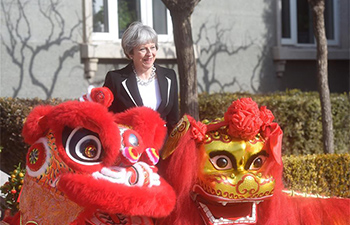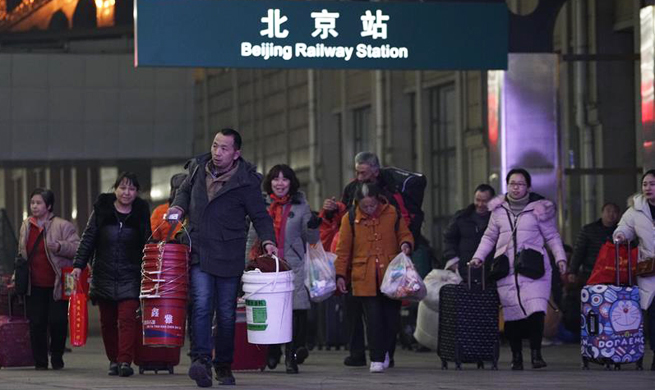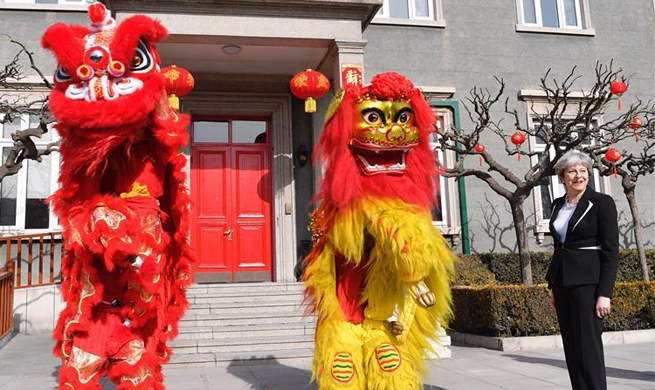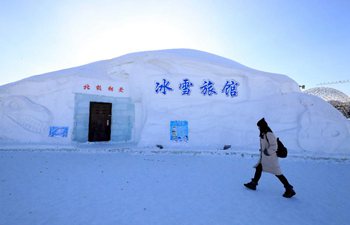BEIJING, Feb. 1 (Xinhua) -- As U.S. Secretary of State Rex Tillerson Thursday kicked off a week-long visit to Latin America, he will experience the vibes from the "America First" policy that has made Washington increasingly alone in the region.
The trip, which will take Tillerson to Mexico, Argentina, Peru and Colombia with a stop in Jamaica, is the first by the U.S. top diplomat to the wider region. He visited Mexico shortly after U.S. President Donald Trump took office more than one year ago.
Tillerson is expected to focus on immigration, trade and the Venezuelan crisis, and the trip is a message that Washington wants to maintain its clout in the continent.
However, in the past year, the U.S. put Latin America aside, and now, "America First" is pushing away its allies there.
Immigration is an important part of the ties between Latin America and the United States. The U.S. is host to over 40 million immigrants from the continent but Washington's stricter immigration policy is building a wall between itself and its southern neighbors.
The Trump administration's immigration plan would limit legal immigration and provide 25 billion U.S. dollars for a U.S.-Mexico border wall.
Also, Washington has ended the temporary protected status for immigrants from Latin American countries such as El Salvador and Haiti. More than 200,000 Salvadorans and 45,000 Haitians have to leave the United States.
On trade, under the guise of seeking fair trade, Washington is questioning multilateralism and free trade, something it was once committed to.
"There is a new focus that is far more centered on reducing trade deficits, on bilateralism, and in certain cases, far more protectionist attitudes," Sebastian Herreros, the representative for economic affairs of the Economic Commission for Latin America and the Caribbean (ECLAC), told Xinhua in an earlier interview.
Shortly after taking office, Trump has threatened to withdraw from the North American Free Trade Agreement unless he gets what he calls a "fair deal."
Washington has made it clear that it will reexamine the trade deals it signed with other countries in the region, such as Chile, Colombia and Peru, to make sure that it is not being taken advantage of.
Such a mercantilist approach could negatively affect trade in the region. Around 24.9 percent of total U.S. exports head to Latin America and the Caribbean, while imports from the region account for 19.2 percent of the total, according to ECLAC.
On foreign relations, a series of U.S. sanctions against Venezuela have made the situation in the South American nation more unstable, while the U.S. tightening its Cuba policy has caused a setback in the rapprochement that occurred during the Obama administration.
Because of the "America First" policy, Uncle Sam has become increasingly unpopular in the region.
A recent Pew Research Center survey showed that only half of Colombians (51 percent), Peruvians (51 percent) and Brazilians (50 percent) have a positive attitude toward the United States. On the other hand, 42 percent of Mexicans view it in a very unfavorable light, a seven-fold increase since 2015.
More and more Latin American nations have turned to countries outside the region, particularly in Asia, seeking investment and trade cooperation.
Washington needs to realize that its "America First" policy would not only pose an obstacle to the region's development, but also make itself more isolated there.
















